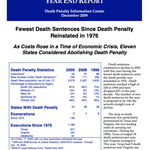The Death Penalty in 2009: Year End Report
Posted on Dec 17, 2009

PRESS RELEASE Top
DPIC’s Year End Report: Death Sentences in U.S. Lowest Since Death Penalty Reinstated in 1976
11 States Considered Ending Capital Punishment during 2009 Budget Crunch
(Washington, D.C.) The country is expected to finish 2009 with the fewest death sentences since the U.S. Supreme Court reinstated the death penalty in 1976, according to a report released today by the Death Penalty Information Center. Eleven states considered abolishing the death penalty this year, a significant increase in legislative activity from previous years, as the high costs and lack of measurable benefits associated with this punishment troubled lawmakers. Read “The Death Penalty in 2009: Year End Report” at http://www.deathpenaltyinfo.org/.
“The annual number of death sentences in the U.S. has dropped for seven straight years and is 60% less than in the 1990s,” said Richard Dieter, the report’s author and DPIC’s executive director. “In the last two years, three states have abolished capital punishment and a growing number of states are asking whether it’s worth keeping. This entire decade has been marked by a declining use of the death penalty.” There were 106 death sentences in 2009 compared with a high of 328 in 1994.
The decline in death sentences was particularly noticeable in Texas and Virginia, the two leading states in carrying out executions. During the 1990s, Texas averaged 34 death sentences per year and Virginia averaged 6. This year, Texas had 9 death sentences and Virginia had 1.
As states were forced to cut essential services this year, many leaders concluded that the death penalty was a wasteful government program that should be considered for repeal. Policymakers found it hard to justify laying off teachers and police officers while maintaining a capital punishment system that is never or seldom used.
New Mexico became the 15th state to abolish the death penalty as Governor Richardson called the alternative of life in prison without parole “a strong punishment” and observed that the cost of the death penalty was “a valid reason [for repeal] in this era of austerity and tight budgets.” The Connecticut legislature voted to end the death penalty before the governor vetoed the bill. Legislation to abolish capital punishment passed in one house of the legislature in Colorado and Montana and came close to passage in Maryland. This trend is expected to continue as the economic crisis persists
Nine men who were sentenced to death were exonerated in 2009, the second highest number of exonerations since the death penalty was reinstated. The total number of exonerations since 1973 is now 139. The public has become skeptical about the government’s ability to avoid mistakes and get the death penalty right. Those sentiments translate into an increasing reluctance to hand down death sentences on the part of courts and juries.
Executions rose in 2009 compared to last year, attributed largely to the lifting of the de facto moratorium on executions during 2008 while the Supreme Court considered the constitutionality of lethal injection. There were 52 executions this year, with no more scheduled, and 37 in 2008. The number of executions this year was 47 percent less than ten years ago. Eighty-seven percent of executions this year were carried out in the south and over half of those were in Texas.
“The rise in executions in 2009 was expected as states were backlogged with cases from the nationwide moratorium. The country continues to move away from the death penalty, as evidenced by the declining rate of death sentences and the movement in several states to repeal it,” said Dieter
Also this year, a nationwide poll of police chiefs showed that the death penalty is at the bottom of priorities among those with experience in law enforcement. The chiefs did not believe the death penalty acted as a deterrent, and they rated it as one of the most inefficient uses of taxpayer money in fighting crime. Challenges to the death penalty came from all quarters, including former Texas Governor Mark White and conservative strategist Richard Viguerie, who expressed doubts about the reliability of this governmental program.
###
The Death Penalty Information Center is a non-profit organization serving the media and the public with analysis and information on issues concerning capital punishment. The Center was founded in 1990 and prepares in-depth reports, issues press releases, conducts briefings for journalists, and serves as a resource to those working on this issue. The Center is widely quoted and consulted by all those concerned with the death penalty. To arrange an interview with DPIC’s Executive Director, Richard Dieter, or for more information about the Year End Report, please contact Corinne Gearhart at (202) 289‑2275 or cgearhart@deathpenaltyinfo.org.